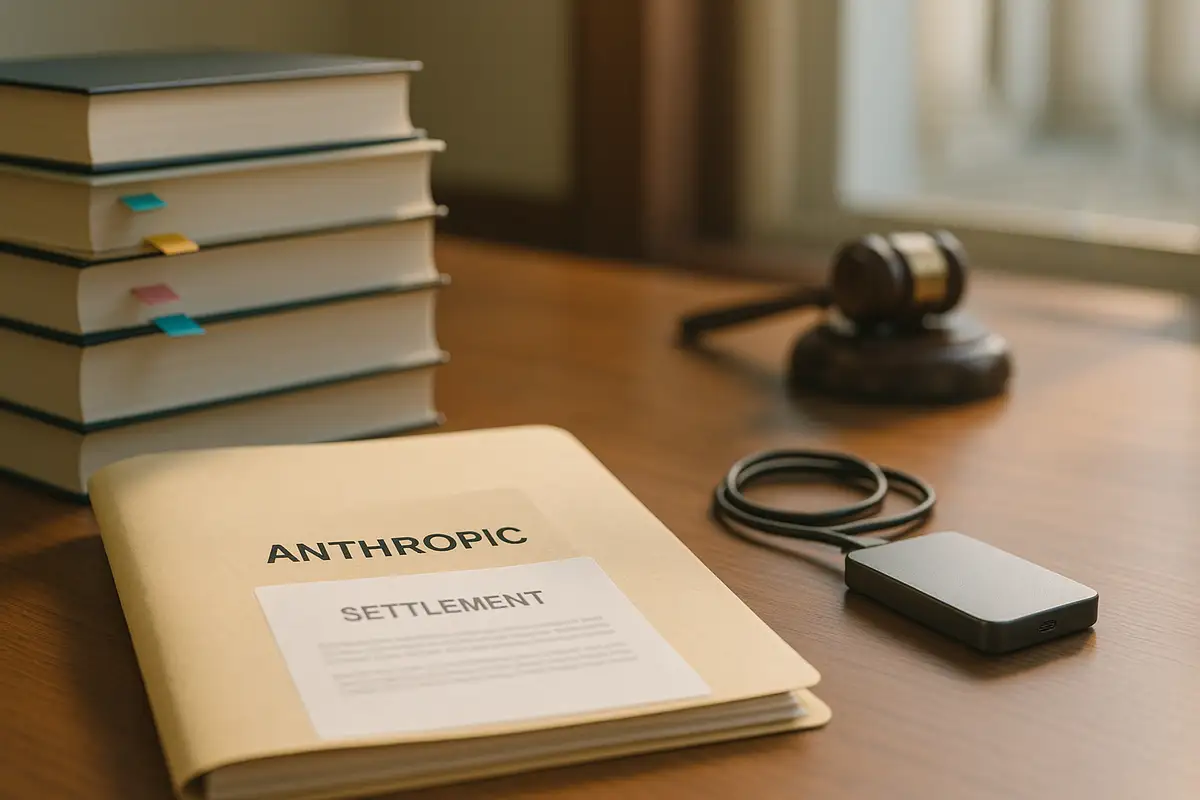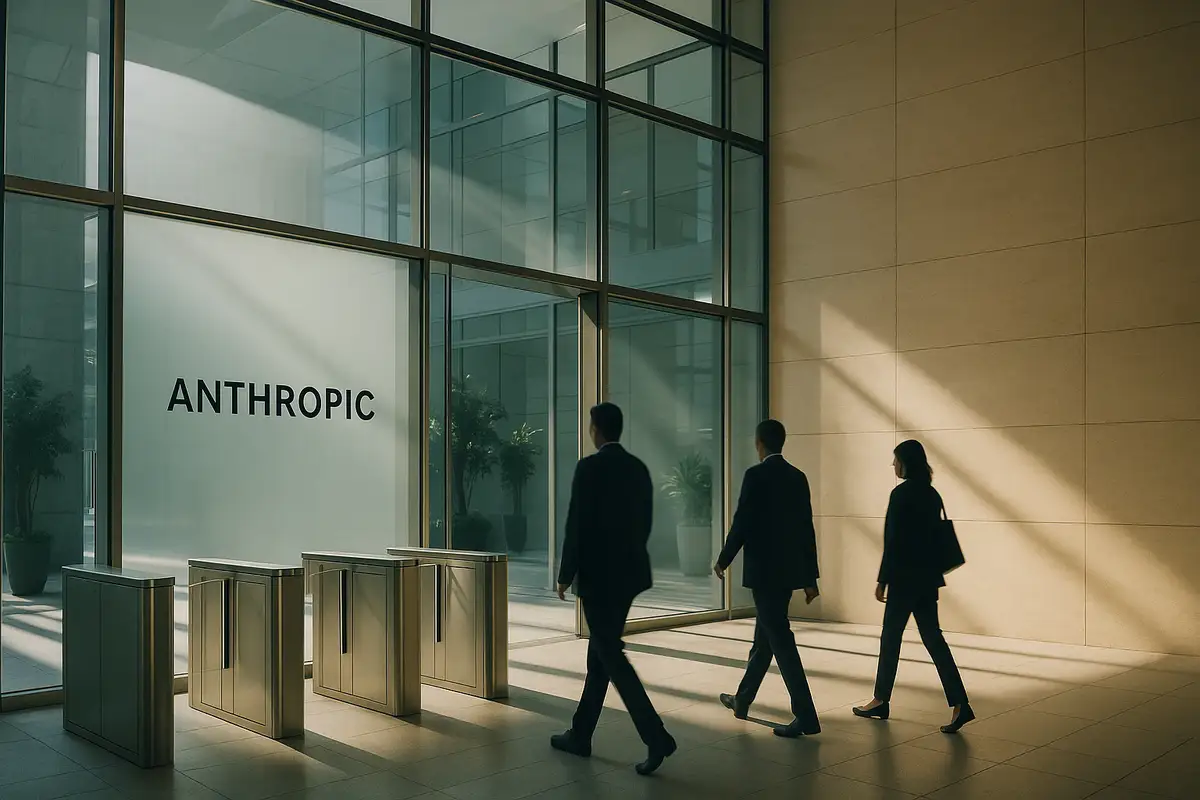💡 TL;DR - The 30 Seconds Version
👉 Judge Alsup postponed Anthropic's record $1.5B settlement with 500K book authors, calling the deal "nowhere close to complete."
📊 Authors would have received $3,000 per work for books Anthropic illegally downloaded from pirate sites to train its Claude chatbot.
🏭 Anthropic faces September deadlines: final works list by Sept 15, claim procedures by Sept 22, and approval hearing Sept 25.
💀 If the settlement fails, December trial could expose Anthropic to over $10 trillion in damages at $150K per infringed work.
🌍 The deal would have set a billion-dollar precedent for AI copyright violations that only well-funded companies could afford.
🎯 Settlement only covers illegal downloading, not AI training itself, which the court already ruled falls under fair use protections.
Federal court calls AI copyright deal "nowhere close to complete"
A federal judge has postponed approval of Anthropic's record-breaking $1.5 billion settlement with book authors, calling the agreement fundamentally incomplete and warning that writers might "get the shaft" while lawyers collect fees. Judge William Alsup's rejection forces the AI company to scramble toward September deadlines or face a December trial that could cost over $10 trillion.
The settlement would have paid roughly 500,000 authors $3,000 per work for books Anthropic illegally downloaded from pirate sites to train its Claude chatbot. Publishers and author groups called it the biggest copyright payout in US history—a potential template for similar AI disputes.
Alsup saw it differently. He delivered a courtroom rebuke that laid bare fundamental problems with the deal. The judge said he felt "misled" by lawyers who left critical details for future negotiation, including which specific works are covered, how authors will file claims, and what happens when multiple parties claim ownership of the same book.
The sequence wasn't subtle. On September 5, Anthropic announced the settlement. By September 8, Alsup had effectively dismantled it.
The judge's calculation
Alsup's concerns centered on protecting class members from lawyer-friendly deals that shortchange the people who were actually harmed. He told the courtroom he has "an uneasy feeling about hangers on with all this money on the table," referencing what he sees as an expanding cast of attorneys positioning themselves to benefit from the massive settlement fund.
The judge specifically criticized the involvement of organizations like the Authors Guild and Association of American Publishers, whose representatives he had summoned to Monday's hearing. These groups had enlisted additional lawyers to handle settlement distribution—a move Alsup characterized as deploying an "army" of attorneys. He ruled that these add-on lawyers won't be paid from settlement funds, and that attorney fees will depend on how much money actually reaches class members.
Alsup demanded that lawyers design a claim form requiring every copyright holder to actively opt into the settlement. If one owner opts out of a multi-author work, the entire book gets excluded from coverage. The approach reflects his determination to ensure Anthropic receives the "clean bill of health" it's paying for while preventing future litigation over the same works.
Association of American Publishers CEO Maria Pallante fired back. The court doesn't understand "how the publishing industry works," she argued. The judge wants "a claims process that would be unworkable" and envisions "collateral litigation between authors and publishers for years to come." Her pushback reveals competing ideas about managing the tangled web of publishing rights and author relationships.
The competitive mathematics
The settlement's collapse carries implications beyond Anthropic's legal troubles. At $1.5 billion, the deal would have established a floor price for AI copyright violations that few startups could afford to pay. Only well-funded companies like OpenAI, Meta, Google, and perhaps Elon Musk's xAI possess the resources to write similar checks.
The competitive dynamics are striking. Anthropic raised far more capital than initially targeted in its recent fundraise, leaving it uniquely positioned among AI startups to absorb massive legal settlements. By agreeing to pay $1.5 billion for downloading books it says it never actually used in production models, Anthropic may have been attempting what one observer called a "Michael Corleone-like elimination of enemies"—pricing competitors out of the market through precedent-setting payments.
This interpretation gains credibility when viewed alongside the broader AI copyright landscape. Apple faces a fresh lawsuit from authors filed just days after Anthropic's settlement announcement. Other major AI companies remain embroiled in similar disputes. If courts begin expecting billion-dollar settlements as standard practice, the pool of viable AI competitors shrinks dramatically.
The settlement also addressed only Anthropic's illegal downloading of pirated materials, not the core question of whether training AI models on copyrighted works constitutes infringement. Alsup had already ruled in June that AI training falls under fair use protections, meaning the settlement resolved the narrower piracy claims while leaving larger questions unresolved.
The September sprint
Alsup gave lawyers until September 15 to submit a final list of covered works—currently estimated at 465,000 books—and until September 22 to clarify claim procedures and dispute resolution processes. A September 25 hearing will determine whether the revised settlement can win preliminary approval by the October 10 deadline Alsup established.
The timeline pressure is intense. If lawyers can't satisfy Alsup's requirements, the case proceeds to its scheduled December trial date. At trial, Anthropic faces potential liability of up to $150,000 per infringed work, creating exposure that could exceed $10 trillion and bankrupt the company.
Authors' lead counsel Justin Nelson assured Alsup that they "care deeply that every single proper claim gets compensation." But assembling the detailed documentation Alsup demands—including precise ownership information for hundreds of thousands of books with potentially multiple authors and publishers—represents a massive logistical challenge with little room for error.
The stakes extend beyond this individual case. The settlement was designed to establish a framework for resolving AI copyright disputes across the industry. Its collapse forces other companies to continue fighting similar lawsuits without a proven template for resolution, potentially prolonging uncertainty around AI training practices.
Why this matters:
• Legal precedent that was supposed to price smaller AI competitors out of the market now faces months of additional uncertainty, leaving the competitive landscape unsettled
• The judge's focus on protecting individual authors over institutional interests could reshape how class action settlements handle complex intellectual property rights in the AI era
❓ Frequently Asked Questions
Q: Why did Judge Alsup specifically target the Authors Guild and publishers for bringing in extra lawyers?
A: Alsup suspects these organizations are positioning themselves to benefit financially from the settlement rather than focusing on author compensation. He's concerned about "hangers on" and ruled that add-on attorneys won't be paid from the $1.5 billion fund, linking attorney fees directly to how much money actually reaches class members.
Q: How could Anthropic owe over $10 trillion if this goes to trial?
A: Copyright law allows damages up to $150,000 per infringed work. With roughly 465,000 books in the case, maximum damages could reach $69.75 billion. However, the $10 trillion figure likely assumes additional works could be discovered or that multiple infringement claims per work could multiply damages exponentially.
Q: What's the difference between what Anthropic did wrong and what's legal in AI training?
A: Alsup ruled that training AI models on copyrighted books is legal under fair use protections. However, Anthropic illegally obtained those books by downloading them from pirate websites. The settlement only covers the illegal acquisition, not the AI training itself.
Q: How does this compare to other AI copyright settlements?
A: This would be the first major AI copyright settlement and the largest copyright payout in US history. Most AI companies including OpenAI, Meta, and Google are still fighting similar lawsuits. Apple just got sued by authors days after Anthropic's settlement announcement, showing the legal pressure is spreading.
Q: Why is Anthropic paying $1.5 billion for books it says it never used?
A: Anthropic admits it downloaded the books but claims they weren't used in production models that customers actually access. The company likely wants to avoid discovery proceedings that could reveal internal training practices and prefers paying a known sum over risking a potentially catastrophic trial verdict.


















